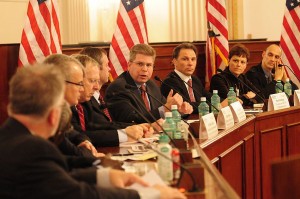Posts Tagged ‘Electric Vehicles’
UPenn’s contribution to electric racing: The Renegade Car
Look out Locust Walk: Here comes UPenn’s electric race car.
http://www.dailypennsylvanian.com/article/igniting-electric-car-scene
Senator Merkley’s love letter to EVs
I’m just going to go ahead and paste the whole piece right in here so there’s not even a click and wait in the way of absorbing this piece published on Valentine’s Day in The Hill, the Capitol Hill reader.
Merkley, a member of the Committee on Environment and Public Works, references his visit to The Washington Auto Show in making the case for electric vehicles:
Electric vehicles can reverse U.S. deficit on energy
Sen. Jeff Merkley (D-Ore.) – 02/14/11 07:26 PM ET
Our nation is currently running a deficit that has put our economy and national security in jeopardy. It is a deficit that every president since Nixon has acknowledged, but one that we have been unable to tame.
If allowed to continue, this deficit will burden future generations – but it has little to do with the budget and everything to do with how most of us get to work, shop for groceries, and drop our kids off at swim practice. The United States is running a massive energy deficit that has left us dependent on oil from some of the most volatile regions of the world.
Right now, America consumes 23 percent of the world’s oil while only controlling 2 percent of the world’s oil reserves. To fuel this oil habit, we are sending $1 billion overseas every day to regimes like Saudi Arabia, Iran and Venezuela – nations that all too often do not share our interests.
As we have seen in the last few weeks as oil prices rise, this dependency also leaves our economy vulnerable to the geopolitics of one of the most unstable regions in the world. Rather than writing checks to the leaders of foreign nations, we should be investing in American energy solutions that put people to work here at home.
One of the most promising tools we have to kick this oil habit and promote American manufacturing is electric vehicle technology.
The good news is that electric vehicle technology is ready to go. At the Washington Auto Show, I popped the hoods of a number of electric vehicles. Two of them, the Chevy Volt and the Nissan LEAF, will be mass-marketed during the coming year. In Oregon, we have companies like Arcimoto, Brammo, Shorepower Technologies, ReVolt, and Eaton Corp.
creating jobs and leading the way in EV technology development and deployment. Moreover, communities across the state are cooperating in one of the nation’s leading efforts at deploying charging infrastructure.
There is broad, bipartisan political support for promoting the production and use of electric vehicles across the country. Sen. Lamar Alexander and I have worked to introduce the Electric Vehicle Deployment Act and are working together now, as well as with other partners in the Senate, to reintroduce that bill. And the White House has recently been shining the spotlight on electric vehicle development as a means of creating jobs and ensuring America remains economically competitive for decades to come. In his State of the Union address, President Obama set forth the goal of putting one million advanced technology vehicles on the road by 2015. The next day, the administration put forward an outline for achieving this goal that largely mirrors the ideas that Sen.
Alexander and I proposed last year.
Our legislation calls for the establishment of a number of deployment communities around the country. The idea is to demonstrate that Americans will adopt the electric vehicles if we can make the technology affordable and get the infrastructure in place quickly. These deployment communities will offer incentives for purchasing electric vehicles, and will target more intense investment in recharging infrastructure. To jumpstart EV production, the bill also includes further incentives for electric battery research and development, and plans to increase electric vehicle purchasing for federal fleets.
The goal is to provide Americans with the opportunity to drive affordable, fuel-saving electric vehicles. But the vision is far broader. By increasing electric vehicle production in America, we will create jobs and bolster our manufacturing industry. By making vehicles more efficient, we will save families money. By utilizing new battery technology, we will reduce harmful pollution and protect the forests, lakes and national parks that millions of Americans drive to every year.
By using American energy instead of foreign oil, we will grow the American economy and strengthen our security.
Electric vehicles are ready to drive American innovation forward.
Merkley is a member of the Committee
on Environment and Public Works.
Voila! EVs for the masses!
Cars and the NYTimes
Ok, so maybe cars and Tom Friedman and Henry Ford 2nd.
Sunday’s Times featured an excellent column by Friedman. I know I’m constantly referencing him, but the guy’s won three Pulitzers. Anyway, his latest has to do with electric cars, as in banking on them. And who does he quote? Shai Agassi of Better Place and Kevin Czinger of Coda Automotive. Both companies I’m proud to say were represented on the panel of the Washington Auto Show’s Green Car Summit on electrification in the auto industry. Here’s a shot of the panelists in the beautiful Caucus Room of the Cannon House Office Building last year.

The man speaking is Scott Becker, Sr. Vice President, Administration & Finance of Nissan North America Inc. To the right of Becker is Kevin Czinger, CEO of Coda Automotive. All the way to the right is Jason Wolf, VP of Better Place.
Here’s the column: http://tinyurl.com/283ju4v
Meanwhile, the Times also had an interesting section devoted to celebrating the 40th anniversary of the op/ed page. For the occasion, the paper highlighted some remarkable comments over the years, including this very prescient quote by Henry Ford 2nd more than 30 years ago. Enjoy:
Op-Ed Contributor
Nov. 28, 1973: Life With Cars
By HENRY FORD 2
Published: September 25, 2010
Even before the Arab oil embargo, policymakers and editorial writers were concluding that one part of the solution to the energy crisis, the environmental crisis and the urban crisis is to build mass transit with highway funds and to persuade drivers to walk, ride bicycles or take a train.
New car sales in the United States, on the other hand, have increased by more than a million a year during the past two model years. Nearly one-third of all American families now own at least two cars, and 95 percent of all urban traveling is done by car.
Cars and mass transit are both here to stay, but neither one is the best possible answer to the important travel needs of today’s cities. For all its flexibility, the car is not the most efficient way to get to or move around in very busy places. For all its efficiency in carrying large numbers of people along busy corridors, mass transit is not flexible enough.
What we need are new kinds of vehicles and systems designed to carry people quickly, conveniently and efficiently where neither cars nor conventional transit can do the job as well. As these new systems are developed and built, cars will become more useful than ever because they will be used where they work best.
The preceding was excerpted and adapted from a previously published Op-Ed article, for inclusion in a 40th-anniversary issue.

